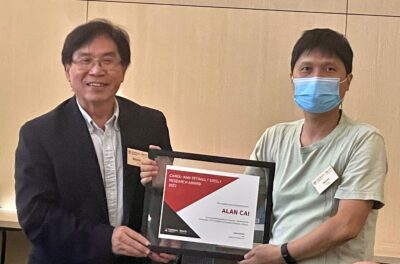Developing Supply Chain Relationships in the Face of Social Differences

Alan Cai is a data analyst—one who prefers to focus on the inner workings of a company rather than the customer-facing challenges of business (he started his career in marketing and quickly pivoted to organizational management for this reason), and yet Alan, professor of Supply Chain Management, is an expert when it comes to relationship building.
Even in the quiet of his office at Carleton University’s Sprott School of Business, Alan’s research is focused on relationships between business partners in the supply chain process and the social influences—such as community logic, social norms, and political ideologies—that are embedded into supply chain decision-making. Alan is excited that his research will contribute to better understanding how to develop, maintain, and grow supplier interactions.
When we think about supply chains, we tend to visualize businesses linked together end to end, where goods and services move from one end to the other. But in fact, it is more like a web of interconnected businesses that rely not just on a linear movement, but on the movement of goods and services from multiples sources.
And so, relationship building within a supply chain requires that the focal company also consider and evaluate the potential relationship dynamics that exist with its other business associations. This is what excites Alan: “There’s a huge human nature component. Humans making decisions on how to interact with other people.”
He sees that supply chain relationships are complicated and that an organization must learn how to design operational procedures to meet many expectations. This not only includes the direct relationship from any one supplier, but also many external forces and pressures that influence decision-makers and their willingness to work within any set of expectations.
Alan is interested in how the distance between two company’s social environments contribute to potential conflict and trust levels with a focus on understanding the relationships between decision-makers. This is critical research because suppliers, of course, are globally accessible. This means that goods and services often come from various countries—each operating under different institutional environments and social pressures. Alan is particularly interested in how carbon emission data play a role in influencing supplier relations.
For example, if a company wants to establish a reputation by following a set of corporate and socially ethical practices—such as a reduction in carbon emissions—then it must consider all its operational practices, including which suppliers that it should select. However, the social pressures in one country to adhere to global/local carbon emission limits may not be as strong as, for example, caring for their employees, people, and community. The goal then is to somehow honour each other’s missions and align in best business practices. Two companies that conduct business but under different social pressures need to build trust with each other.
“It becomes a really difficult operations-management decision under different institutional pressures. How do businesses navigate the difference? Can you trust the supplier for what they say they did? How do you measure it? That’s the difficult part.”
For this, their research often relies on qualitative questionnaires measuring management judgment that include questions such as: “In your heart, do you trust your supplier?” And, “What kinds of measures do you take to evaluate your supply chain managers?” They also rely on big data to study how firms from different countries navigate their relationships under disparate social and environmental practices.
Alan and his colleagues will compare the data from companies that show high levels of trust to those that show low levels and determine variables that contribute to both successes and failures. Alan’s research goal is to bring awareness on how to improve the relationship between the supply chain members while concurrently allowing them to fit within the social constructs and pressures.
Alan’s research is extremely timely.
“The pandemic has taught us that we need to be flexible. Companies may face future adversities, so those savvy companies will be prepared to shift and reorganize.”
As such, Alan and his colleagues’ concurrent research includes applying sociology and economic theories to see how restauranteur decision-making was affected during the early stages of the Coronavirus pandemic. Restauranteurs had to determine between shutting down and laying off workers or staying open and keeping people employed, but risk spreading the disease.
“It’s a difficult trade-off because there are social pressures at play. Cultural tightness for example—how strongly will society enforce the social norms—cannot be overlooked. The restauranteur is under pressure from not only societal and community expectation, but from government rules and regulations as well. It’s very interactive decision-making.”
Additionally, Alan’s most recent research project will reveal some interesting results about the effects of supply chain disruptions on geographic clusters of small businesses. It is under wraps for now, but Alan is very excited about the emerging concepts so far.
“Results that will contribute greatly to our understanding of supply chain relations and ultimately create a globally resilient supply chain process.”